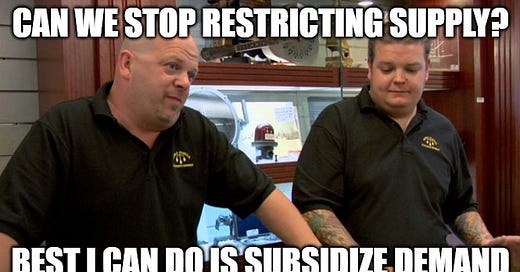Keeping up with the FITs, 5/30
William Deresiewicz on college students; John Cochrane on solar panel tariffs; Norman Ornstein and Scott Alexander on mental illness; de Rugy and Kling on fiscal distress;
College is now regarded as the last stage of childhood, not the first of adulthood. But one of the pitfalls of regarding college as the last stage of childhood is that if you do so then it very well might not be. The nature of woke protests, the absence of Covid and other protests, the whole phenomenon of excellent sheephood: all of them speak to the central dilemma of contemporary youth, which is that society has not given them any way to grow up—not financially, not psychologically, not morally.
Solar panels are key to the transition to carbon-free energy. Since the Earth will be unlivable due to the climate catastrophe if we don't move now, at least according to the Administration, you would think they would be doing everything to encourage solar panel installation. Since mother Gaia does not care where panels are produced, you would think the Administration would not either. If China can produce them cheaper, all the better for the Earth. If China wants to tax its citizens to subsidize our solar panels better still. It's the least they could do in return for adding a new coal-fired power plant about once a week. You would be wrong. Our policy is
a punitive 2012 tariff levied by the U.S. Commerce Department.
…By the way, the federal government pays a tax credit of 26% of the price of a new solar system installed by U.S. residential customers.
Tariffs to make things more expensive, and subsidies to help people pay the higher price. Only in America!
Beside medications, cognitive behavioral therapy is often effective. Wraparound services—therapy, peer support, housing—can make a huge difference. To ignore anosognosia while suggesting that it may be a good idea to shun existing medications, consigns wonderful people to a living Hell.
The philosophical question is whether anyone should have the power to say that another person has a better self and coerce the other person to obtain treatment in order to try to surface that better self. I hear Ornstein saying yes, and I agree with him. I also agree when he says,
Of course, there should be safeguards to prevent going back to the cruel and coercive past, and to guard against abuses. We need better standards to determine when people are truly incapable of understanding that they have serious brain diseases.
Scott Alexander, as always, is a voice of reason.
Many autistic people live great lives, enjoy the beneficial parts of their condition, and find it annoying or oppressive when psychiatrists keep trying to medicate them. Many other autistic people can’t live outside of institutions and constantly try to chew off their own body parts. A reasonable conclusion might be “the first group seem mild and should be left alone, the second group seem severe and probably need intensive treatment”, but it’s surprisingly hard to convince people of this.
Veronique de Rugy and I write,
Higher interest payments crowd out other spending and effectively impose “fiscal consolidation”—that is, austerity—which is politically unpopular. In addition, higher interest payments would themselves likely be deficit financed, which could throw more oil on the inflation fire. This outcome would be dangerous and expensive. However, failing to raise interest rates risks accelerating inflation, at least until all inflationary pressure has dissipated. With inflation at 8.5 percent, this risk is significant, especially given that even the Fed’s promise to raise interest rates to 2.75 percent leaves the inflation-adjusted cost of borrowing at a stunning −5.75 percent.
What Tyler Cowen calls “the great forgetting” looks more and more dangerous every day.





Deresiewicz: "society has not given them any way to grow up." I'm with Lady Thatcher here: society does not exist. My wife and I have two children. One is a published author, married to a financial adviser, and has two children. They are homeowners. The other, ten years younger, works for a financial advising firm, is working through her certification exams, is married to a self-taught video game programmer who is now in the process of being hired for a management position. Also homeowners. We have nine nieces and nephews. All but one are married, at least one of each couple has a permanent job, some in the professions, some in the trades. The married ones all have children. Each nuclear family unit is self-supporting. In short, they are "adulting" within the same society claimed incapable of teaching them how to do so. Most of these are late Gen Xers or Millennials. It's the family, not "society."
It feels like we need a new term to describe our current macro environment. High inflation plus high unemployment = stagflation. What is high inflation + high unemployment + high debt burden? This is the trilemma we are facing. Since it is materially different than the 1970’s, shouldn’t we call it something different?